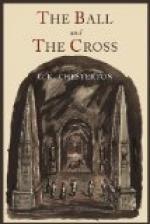“No, the pretty things aren’t here,” said the demi-god in buttons, caressingly. “The pretty things are downstairs. You come along with me. There’s something that will surprise you downstairs; something you want very much to see.”
Evidently the man in buttons did not feel like a god, so Michael made no attempt to explain his feelings to him, but followed him meekly enough down the trail of the serpentine staircase. He had no notion where or at what level he was. He was still full of the cold splendour of space, and of what a French writer has brilliantly named the “vertigo of the infinite,” when another door opened, and with a shock indescribable he found himself on the familiar level, in a street full of faces, with the houses and even the lamp-posts above his head. He felt suddenly happy and suddenly indescribably small. He fancied he had been changed into a child again; his eyes sought the pavement seriously as children’s do, as if it were a thing with which something satisfactory could be done. He felt the full warmth of that pleasure from which the proud shut themselves out; the pleasure which not only goes with humiliation, but which almost is humiliation. Men who have escaped death by a hair have it, and men whose love is returned by a woman unexpectedly, and men whose sins are forgiven them. Everything his eye fell on it feasted on, not aesthetically, but with a plain, jolly appetite as of a boy eating buns. He relished the squareness of the houses; he liked their clean angles as if he had just cut them with a knife. The lit squares of the shop windows excited him as the young are excited by the lit stage of some promising pantomime. He happened to see in one shop which projected with a bulging bravery on to the pavement some square tins of potted meat, and it seemed like a hint of a hundred hilarious high teas in a hundred streets of the world. He was, perhaps, the happiest of all the children of men. For in that unendurable instant when he hung, half slipping, to the ball of St. Paul’s, the whole universe had been destroyed and re-created.
Suddenly through all the din of the dark streets came a crash of glass. With that mysterious suddenness of the Cockney mob, a rush was made in the right direction, a dingy office, next to the shop of the potted meat. The pane of glass was lying in splinters about the pavement. And the police already had their hands on a very tall young man, with dark, lank hair and dark, dazed eyes, with a grey plaid over his shoulder, who had just smashed the shop window with a single blow of his stick.
“I’d do it again,” said the young man, with a furious white face. “Anybody would have done it. Did you see what it said? I swear I’d do it again.” Then his eyes encountered the monkish habit of Michael, and he pulled off his grey tam-o’-shanter with the gesture of a Catholic.
“Father, did you see what they said?” he cried, trembling. “Did you see what they dared to say? I didn’t understand it at first. I read it half through before I broke the window.”




